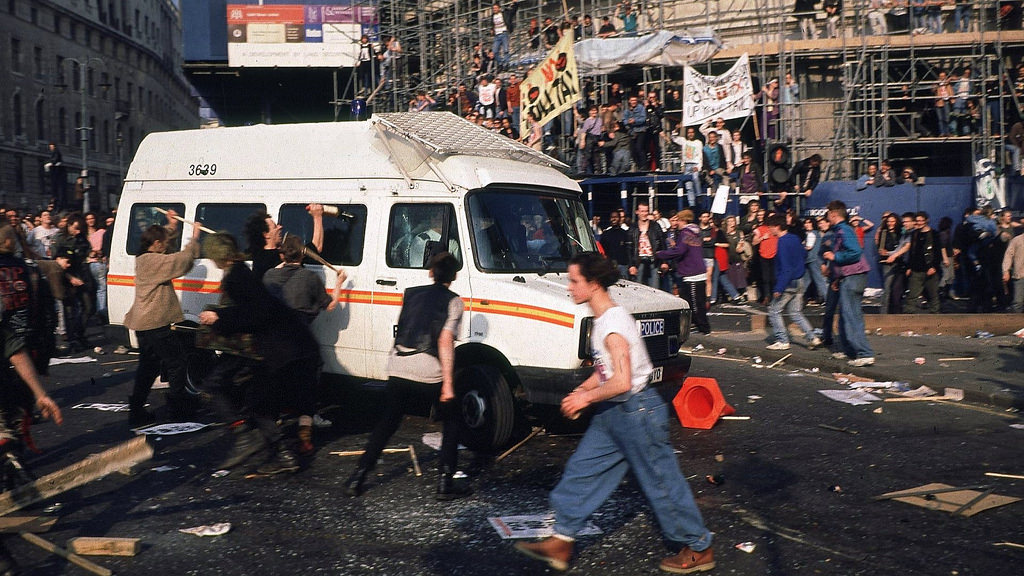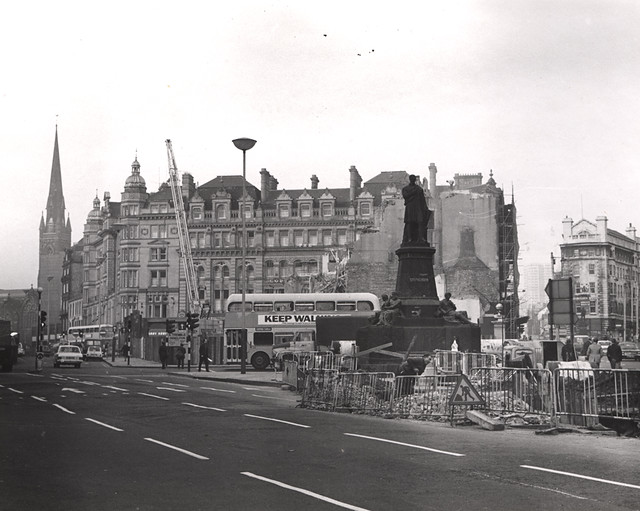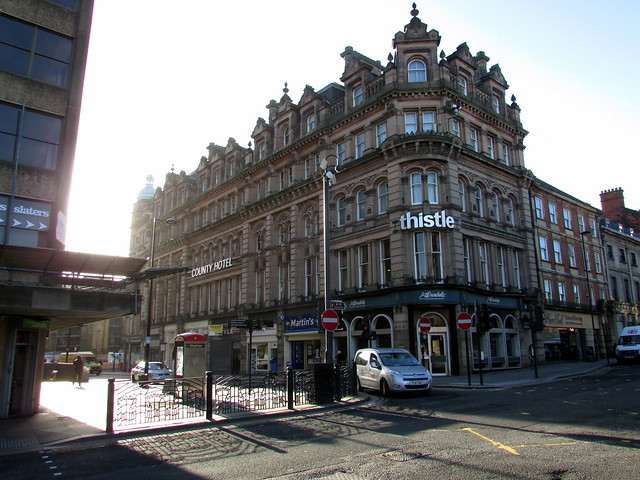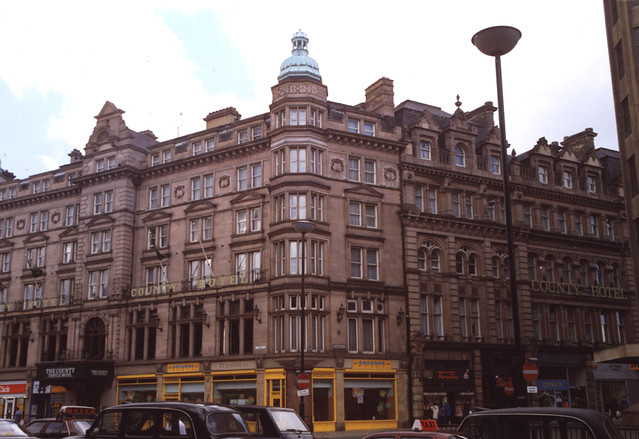memories of the Nineties!

-
Description
Throughout her years in power Maggie Thatcher always seemed utterly invulnerable. Like a T-1000 in pearls and a power suit, she’d taken on Argentina, the trade unions and a host of EU leaders and brow-beaten them all into submission, so the speed with which she was eventually toppled by members of her own party made her exit all the more shocking. https://www.youtube.com/watch?v=NI5rcvsLxZI" rel="nofollow">www.youtube.com/watch?v=NI5rcvsLxZI Peering tearily out of her official car as it whisked her away from No.10, the nation watched on TV as one of the most divisive political leaders in British history’s time in power ended not with a bang, but with a whimper. https://www.youtube.com/watch?v=Im9c1JHtrI0" rel="nofollow">www.youtube.com/watch?v=Im9c1JHtrI0 Theresa May Shows Europe She's No Margaret Thatcher - Thatcher spoke loudly in a 1988 speech, and carried a big stick. On Friday, May spoke softly. No stick. Margaret Thatcher redefined the U.K.'s relationship to Europe in 1988 in a fierce speech on the continent that chastised her European partners while promising to stick with them. Twenty-nine years later, Prime Minister Theresa May made a similar journey to do the opposite. In a speech Friday in Florence, May addressed continental Europe softly, about separation. When Thatcher went to Bruges, Belgium, she scolded her European partners for being protectionist, illiberal and too attached to stifling, sovereignty-destroying bureaucracies. Her tone was challenging, even brash. EU officials were affronted and angry. But she assured them of Britain's good faith as a committed European. "Britain," she said, "does not dream of some cozy, isolated existence on the fringes of the European Community." May spoke from those very fringes; her pitch was that Britain will be a good neighbor. Her conciliatory tone reflected the U.K.'s relative weakness as it negotiates the terms of the exit from the European Union that its citizens voted for in June, 2016. There were no hard demands, only promises of concessions and pleas for more time. Thatcher's speech opened up new divisions in her own cabinet and became a rallying cry for a growing Euroskeptic movement; it sped her eventual downfall. May inherited her party's deep divisions on Europe and her speech glossed over them, but the cabinet solidarity on display in Florence already showed signs of cracking by the end of the weekend. The opposition Labour Party is preparing its troops for a snap election. While Thatcher believed strongly in the single market, May has had to concede that Britain is heading out of it. She promised that the U.K. would continue to pay into the EU budget during a proposed transition period (of "about" two years) and that the rights of EU citizens in Britain would be guaranteed, with British courts taking European Court of Justice rulings into account (something Brexiters staunchly opposed). These go some way to meeting European demands that are a precondition for talks on the new trade deal Britain seeks. But her speech was short on specifics. The EU's chief negotiator, Michel Barnier, characterized her statements as a "step forward" but said that they "must now be translated into a precise negotiating position of the U.K. government." French President Emmanuel Macron was more pointed: "Before we move forward, we want to clarify matters concerning the settlement of European citizens, the financial terms of exit and the question of Ireland, he said. "If these three points are not clarified, we will not be able to advance on the rest." Macron can't be indifferent to what kind of deal emerges: The U.K. is one of France's largest export destinations. Nor can other major EU economies. A Spanish government report leaked to El Pais in March said that Brexit would hurt Spain's economy, with everything from fisheries to Spanish soccer players taking a hit. Still, May would be foolish to believe that economic interest trumps the greater political interest in seeing the European project succeed. The retreat of a populist threat and much rosier economic growth may ironically make Europe less eager to agree to terms that allow the U.K. to claim a victory. In that sense, the call by her foreign secretary, Boris Johnson, for a "glorious" future outside Europe may have pleased Brexiters, but doesn't reflect the reality today. The U.K. economy has already lost momentum since the Brexit vote and while it will remain large and diversified, there is more pain to come. The anti poll tax riot in 1990 helped oust the Iron Lady. The 200,000-strong anti poll tax demonstration in London on 31 March 1990 was a huge show of opposition to Thatcher’s hated tax. The tax would snatch the same amount of money from everyone—regardless of wealth. Millions of ordinary people were rightly furious. Mainstream newspapers and politicians condemned the riot, blaming it on anarchists and revolutionaries. In reality, police provoked the riot—and protesters were absolutely right to fight back. The movement against the poll tax was a mass movement. This was its strength. The tax was first introduced in Scotland in 1989, triggering a non-payment campaign involving millions. More than 400 people were arrested and property was damaged with repairs estimated at £400,000 after the demonstration which saw 100,000 people turn out to protest against the poll tax. The demonstration had been proceeded by many smaller rallies across the country. The poll tax enraged people because it was a levy on individuals regardless of means. Its unpopularity contributed to the downfall of Margaret Thatcher who resigned in November 1990 after 11 years at the helm of British politics. https://www.youtube.com/watch?v=5o98_hia8tA" rel="nofollow">www.youtube.com/watch?v=5o98_hia8tA Her successor, John Major, appointed Michael Heseltine Environment Secretary to dismantle the poll tax. It was replaced by the council tax - a levy related to the value of a house. Divisions over Europe and membership of the European Union plagued both of the U.K.'s governments in the 1990s. Foreign Secretary Geoffrey Howe announced his resignation from Margaret Thatcher's Conservative government in November 1990, directly leading to her downfall. Major had to abandon his government's monetary policy and withdraw Britain from the Exchange Rate Mechanism. Tony Blair was a popular leader in Europe and negotiated a number of important deals for the U.K. Over Blair's complete term of office, his principal failure was to fail in attempts to hold a British referendum on the adoption of the Euro currency. Other news Memories of the 1950s, 1960s and 1970s are dominated by music and fashion, but the 1990s are summed up by unemployment and moral decline. It was the decade of the Gulf War, Britpop, New Labour and the death of Princess Diana. The 1990s were a relatively peaceful time of prosperity. For most of the 1990s, Bill Clinton was president, the first baby boomer to live in the White House as the commander-in-chief. The Berlin Wall, the prime symbol of the Cold War, fell in November 1989, and Germany was reunited in 1990 after 45 years of separation. The Cold War officially ended with the fall of the Soviet Union on Christmas Day 1991, and it seemed as if a new era had dawned. The '90s witnessed the deaths of super celebrities Princess Diana and John F. Kennedy Jr. and the impeachment of Bill Clinton, which did not result in a conviction. In 1995, O.J. Simpson was found not guilty of the double murder of his ex-wife, Nicole Brown Simpson, and Ron Goldman in what's been called the trial of the century. The decade closed with the sun coming up on a new millennium on Jan. 1, 2000. 1990s Timeline 31 March 1990 Introduction of new local taxes sparks 'poll tax' riots in London - The Conservative plans for a 'poll tax', introduced in England and Wales on 1 April 1990, provoked vocal opposition across Britain in the form of anti-poll tax rallies and acts of civil disobedience. A largely peaceful march in London, attended by 70,000 people, degenerated into serious rioting centred on Trafalgar Square. The unpopularity of the tax contributed to the downfall of Margaret Thatcher. Her successor John Major replaced the poll tax with the council tax. 22 November 1990 Margaret Thatcher resigns and John Major becomes prime minister - Faced by large-scale opposition within her own parliamentary party, Margaret Thatcher, who was widely seen as remote and autocratic, resigned as prime minister and leader of the Conservative Party. The crisis of confidence in her leadership had been sparked by her attitude to Europe, while her support for the so-called 'poll tax' had undermined her standing with the electorate. Five days later, John Major succeeded her as party leader and prime minister. 17 January 1991 Liberation of Kuwait begins as Allies launch Operation Desert Storm - Iraqi President Saddam Hussein ordered the invasion of Kuwait in August 1990 and refused to withdraw. Following a massive military build up, US-led forces backed by a United Nations mandate launched 'Operation Desert Storm' to liberate Kuwait. A huge aerial bombardment preceded the ground attack on 24 February. The Iraqi army fell into headlong retreat and on 27 February, US President George Bush declared that Kuwait had been liberated. Saddam Hussein remained in power in Iraq. 9 April 1992 Conservatives win the general election, returning John Major as prime minister - A poor Labour campaign by leader Neil Kinnock squandered significant support for the opposition and helped Conservative John Major to a surprise general election victory, with a slim overall majority of 21. The Conservatives won 326 seats, Labour 271. 6 May 1992 Channel Tunnel opens, linking London and Paris by rail - The Channel Tunnel provided an unprecedented rail link between London and Paris, something that had been planned for over a century. The tunnel became the longest undersea tunnel in the world, measuring 50km in total, with 39km of it under the sea. Three tunnels - two for trains and one for service - lie an average of 40m below the sea bed. 16 September 1992 'Black Wednesday' forces withdrawal of sterling from the ERM - Sterling, under strong financial pressure from speculation on the money markets, was pulled out of the European Union's Exchange Rate Mechanism. This was a major blow to the Conservatives' reputation for economic competence, but it relieved pressure on Britain's economy by ensuring that the currency could float independently. 1994 First women priests are ordained by the Church of England - The decision to ordain women to the priesthood in the Church of England was taken in 1992 and implemented in 1994. It was a controversial step, welcomed by most of the church but rejected by traditionalists, some of whom joined the Catholic Church in protest. 1 May 1997 Labour wins the general election, with Tony Blair as prime minister - Tony Blair had become leader of the Labour Party in 1994 after the sudden death of John Smith. Blair continued the modernisation of the party begun by Smith. Voters responded to 'New Labour' in the 1997 election, giving the party a huge majority of 179 seats. One of the new Labour government's first acts was to give the Bank of England control of interest rates. It also embarked on a programme of far-reaching constitutional reform. 1 July 1997 Britain hands Hong Kong back to China - After more than 150 years of British rule, Hong Kong was returned to Chinese control. Britain had held the New Territories north of Hong Kong under a 99-year lease that expired in 1997, requiring the 'handing back' of the colony to China. Under the 'One Country, Two Systems' policy, Hong Kong retained its own legal system, currency, customs policy and immigration laws for a minimum 50 years after the handover. 31 August 1997 Diana, Princess of Wales, dies in a car crash in Paris - Diana was the ex-wife of the heir to the British throne, Charles, Prince of Wales. A controversial figure in life, Diana's death in a car crash in Paris provoked widespread public mourning. On 6 September, one million people lined the streets of London for her funeral. It was later discovered that the driver of the car in which he, Diana and her friend Dodi Al Fayed were killed had more than the legal limit of alcohol in his blood and was travelling at over 100mph. September 1997 Scotland and Wales vote in favour of devolution - In two referenda, a large majority in Scotland (74.9% of those who voted), and a smaller one in Wales (50.3%), provided the basis for the creation of national assemblies with legislative powers. The assemblies first met in 1999, with the Scottish Parliament, but not the Welsh Assembly, gaining tax-varying powers. 10 April 1998 Good Friday Agreement establishes a devolved Northern Irish assembly - An agreement between Northern Ireland's nationalists and unionists was reached after 30 years of conflict, as a result British government negotiations and US pressure on Sinn Féin, the political wing of the Irish Republican Army. It set out plans for devolved government and provided for the early release of terrorist prisoners and the decommissioning of paramilitary weapons. Referenda in Northern Ireland and the Republic of Ireland endorsed the agreement on 22 May. The assembly met on 1 July. 1 January 1999 Britain decides not to join the European Single Currency - Widespread British unease about the European single currency obliged Prime Minister Tony Blair, who was keen on the project, to stay out. The 'euro' was launched as an electronic currency used by banks, foreign exchange dealers, big firms and stock markets in 1999. Euro coins first hit the streets of the 12 'eurozone' countries on 1 January 2002. Tech But for many of you, it is the birth of the worldwide web, the internet and the dotcom boom that you remember most. The boom in personal computers and the emergence of the internet have to be among the defining features of the decade, forever changing the way we all live. When the young British scientist, Tim Berners-Lee, invented the worldwide web, he revolutionised the way we live. In other ways, technology was leaping ahead. Mobile phones became more advanced and gaming became big business. Before the launch of the Nintendo Gameboy, video games were played in the family living room in front of the TV on games consoles roughly the size of your mother’s sideboard. Then, suddenly, we were freed and school lunch times would never be the same again. After watching "Home Alone 2," everyone wanted a Talkboy. This little gadget let you record and playback whatever you wanted, plus speed up or slow down recordings to make yourself sound ridiculous. The Sega Genesis, which came bundled with Sonic the Hedgehog, was technically released in the U.S. in 1988 but didn't start really winning our hearts until the '90s. It didn't matter that your Sony Discman would skip despite its anti-shock protection, you loved it all the same. After Walkmans lost their touch and before MP3 players were cool, Sony's MiniDisc player let you play up to 80 minutes of music. Sony killed the MiniDisc player off in 2013. Your Easy Bake Oven let you pretend you knew how to bake stuff without any of the liability of using a real stove. Pop "Super Mario" into your Nintendo 64, and you were in gaming paradise for hours. Sure, we forgot to feed them occasionally, but there was no digital pet better than a Tamagotchi (sorry Nano Pets). The popularity of mobile phones went bananas in the '90s. Of course, most were huge and chunky. Nintendo released the Game Boy Color in 1998, and it changed the way we played handheld video games. Beepers started dying out in the mid-'90s with the rise of mobile phones, but we will always remember them fondly for their beautiful simplicity. After the original Sony PlayStation was released in 1994, video games became more mainstream and Crash became everyone's favorite bandicoot. If you were a business person in the late '90s, chances are you had a PalmPilot to make appointments, store contacts, and send messages. When Apple released the iMac G3 in 1998, we went wild for the all-in-one, rainbow array. Before there were thumb drives and Dropbox, you'd have to store your class projects on floppy disks. https://www.youtube.com/watch?v=9EHDVvx-dQs" rel="nofollow">www.youtube.com/watch?v=9EHDVvx-dQs Fashion It remains a mystery why an entire generation adopted the shell suit as the must-have leisurewear of the era. They didn’t look nice, didn’t feel nice and brushing up against the arm of a sofa was usually enough to wear a hole in them, yet parents still felt the need to rush out to the nearest covered market so that they could wrap their children in these shapeless crepe paper creations, Very Strange?. Buffalo Shoes - The Spice Girls really started something with Buffalo. Pretty soon we were all bouncing around on sky-high sponge platform trainers thinking we looked the shizz. Combat Trousers - The All Saints ladies made utility pants a bona fide trend. It basically meant we all walked around with our knickers hanging out. Mesh Tops - Anything netted or see-through meant you had major wardrobe game back in the ‘90s. Making your own out of ratty old school tights was perfectly acceptable. Knee High Boots - A platform heel was essential, and if you had a pair in white PVC you were the actual bomb. Tiny Backpacks - Completely impractical yet totally uh-mazing. Your choice of Disney character/sports drawstring/pastel fluffy blob (that got a bit matted) pretty much defined your teenage identity for like, all time. Leopard Print Coats - From rock stars to ladettes, a leopard print coat gave you instant pub-landlady glam. Square Sunglasses - Yeah. What was with this trend? The Appleton sisters were all over it. Chokers - From thick velvet Victoriana style, to those weird plastic twisty things, every teenage ‘90s girl owned a choker. The cool sixth form girls rocked ones with ying yang symbols, and we coveted them from the far end of the playground. Music When people think about British music, for the most part they think about the 60s or 70s with the likes of the Beatles and The Rolling Stones or more modern artists like Adele or Ed Sheeran. However stuck between these two eras was, in my opinion, British music's best period. The 90s were an optimistic time for Britain and indeed Europe, with the economy recovering from the lows of the 80s and the Cold War ending and that reflected in the cultural contribution the decade made. One of the defining features of 90s music was the birth of 'Britpop'. This was a style of pop music that aimed to promote 'Britishness' and commonly featured electric guitars, drums and male singers. It was said to be an answer to the 'grunge' movement that originated in the United States, of which Nirvana are the most famous example. Britpop was the style used by world-famous bands such as Oasis, Blur, Pulp and Suede who became known as 'The Big Four' thanks to their domination of the charts at this time. The summer of 1995 was dominated by the 'Battle of Britpop' which was between Blur and Oasis for the number 1 spot. Eventually, Blur won the battle and Oasis settled for second. Britpop continues to have a cultural impact today with modern fashion influenced by the 90s becoming more and more popular as exemplified by the popularity of bucket hats! However the 90s weren't only for the boys, with major female groups also finding fame. The most well-known of which were the Spice Girls who were incredibly popular in Britain and around the world. Once again they promoted 'Britishness' and had catchy melodies and lyrics, but they also started the 'Girl Power' movement which was heavily linked to feminism and helped empower girls and women worldwide. It isn't too far to assume that without their music, many female singers and artists who we love today would not have had the confidence to chase their dream. The fame gained by the Spice Girls meant that after 2000, girl groups were always in the British charts with Atomic Kitten, Sugababes and Girls Aloud the most famous. British music may have had many great times and we are very proud of our music industry in Britain, however the 90s are often overlooked and I feel that they are in fact one of the most important eras in history. So many different things can be said to have been influenced by the 90s and I feel that the decade should get the recognition it deserves!. 1990s bestselling albums 1 (What’s The Story) Morning Glory, Oasis, 1995 2 Stars, Simply Red, 1991 3 Spice, Spice Girls, 1996 4 Talk On Corners, The Corrs, 1997 5 Jagged Little Pill, Alanis Morissette, 1995 6 Robson & Jerome, R Green & J Flynn, 1995 7 The Immaculate Collection, Madonna, 1990 8 Urban Hymns, The Verve, 1997 9 Gold: Greatest Hits, Abba, 1992 10 Falling Into You, Celine Dion, 1996 1990s bestselling singles 1 Candle in the Wind 97/Something About the Way You Look Tonight, Elton John, 1997 2 Unchained Melody/White Cliffs of Dover, Robson Green & Jerome Flynn, 1995 3 Love is All Around, Wet Wet Wet, 1994 4 Barbie Girl, Aqua, 1997 5 Believe, Cher, 1998 6 Perfect Day, Various Artists, 1997 7 (Everything I Do) I Do it For You, Bryan Adams, 1991 8 … Baby One More Time, Britney Spears, 1999 9 I’ll Be Missing You, Puff Daddy & Faith Evans (Feat. 112), 1997 10 I Will Always Love You, Whitney Houston, 1992 1990s top movies 1 Titanic 1998 2 Jurassic Park 1993 3 The Full Monty 1997 4 Star Wars Episode 1: The Phantom Menace 1999 5 Independence Day 1996 6 Men in Black 1997 7 Four Weddings and a Funeral 1994 8 Ghost 1996 9 A Bug’s Life 1999 10 The Lion King 1994 1990s top West End shows 1 Buddy – The Buddy Holly Story 1995 2 Chicago – the Musical 1997 3 Lion King 1999 4 Mamma Mia! 1999 5 Complete Works of William Shakespeare 1996 6 Don’t Dress for Dinner 1991 7 An Inspector Calls 1995 8 Art 1996 9 Complete History of America 1996 10 Sunset Boulevard 1993 1990s UK Christmas Adverts Compilation https://www.youtube.com/watch?v=tJnN26bzYec" rel="nofollow">www.youtube.com/watch?v=tJnN26bzYec -
Owner
brizzle born and bred -
Source
Flickr (Flickr) -
License
What does this mean? Attribution-ShareAlike License
-
Further information
Link: https://www.flickr.com/photos/20654194@N07/23475198708/
Resource type: Image
Added by: Peter Smith
Last modified: 7 years, 12 months ago
Viewed: 1032 times
Picture Taken: 2017-09-26T09:15:21 -
Co-Curate tags







